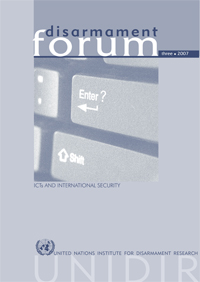Information and communication technologies (ICTs) are embedded in every aspect of our lives—from the ability to communicate with Internet users around the world in real time, to the infrastructure that provides electricity to our homes and telephony to our office, to connecting our national security and defence networks. While global connectivity and development of ICTs have produced undeniable positive benefits, our reliance on ICTs and their ubiquitous nature have created new vulnerabilities.
There is increasing concern that these vulnerabilities can or will be exploited through cyber-warfare, cyberterrorism or attacks on critical information infrastructure. Yet there is little shared understanding of the terminology or definitions thereof among the range of actors—governments, the private sector, individuals, criminals, even terrorists—active in or concerned about these issues. Further, there are differing interpretations of whether the existing international legal framework is adequate in relation to acts of information warfare or cyberterrorism. A United Nations Group of Governmental Experts is expected to be convened in 2009 "to continue to study existing and potential threats in the sphere of information security and possible cooperative measures to address them" (General Assembly resolution 60/45)—building on the initial efforts of the 2005 UN Group of Governmental Experts on Developments in the Field of Information and Telecommunications in the Context of International Security.
This issue of Disarmament Forum focuses on the civil and military threats posed by the use of ICTs for military, terrorist and political purposes that run counter to the maintenance of international security, and which could cause serious political, social and economic consequences. In order to encourage discussion, a wide range of perspectives on topics related to information security are presented herein. These include legal aspects of cyberspace and information warfare as they relate to national and international security; a discussion of cyberterrorism and Internet governance issues; how risks to critical information infrastructure can be analysed; and how various international and regional forums are addressing particular aspects of the information security issue.
Citation: Kerstin Vignard (ed.) (2007). "Disarmament Forum: ICTs and International Security", UNIDIR, Geneva.
Disponible aussi en français.
Content
- Editor’s note, Kerstin Vignard
- Special Comment, Andrey Krutskikh
- International information security: description and legal aspects, A.A. Streltsov
- Critical information infrastructure: vulnerabilities, threats and responses, Myriam Dunn Cavelty
- Terrorism and Internet governance: core issues, Maura Conway
- Military aspects of ensuring international information security in the context of elaborating universally acknowledged principles of international law, Sergei Komov, Sergei Korotkov & Igor Dylevski
- Harnessing the perils in cyberspace: who is in charge? Henning Wegener
- UNIDIR focus
